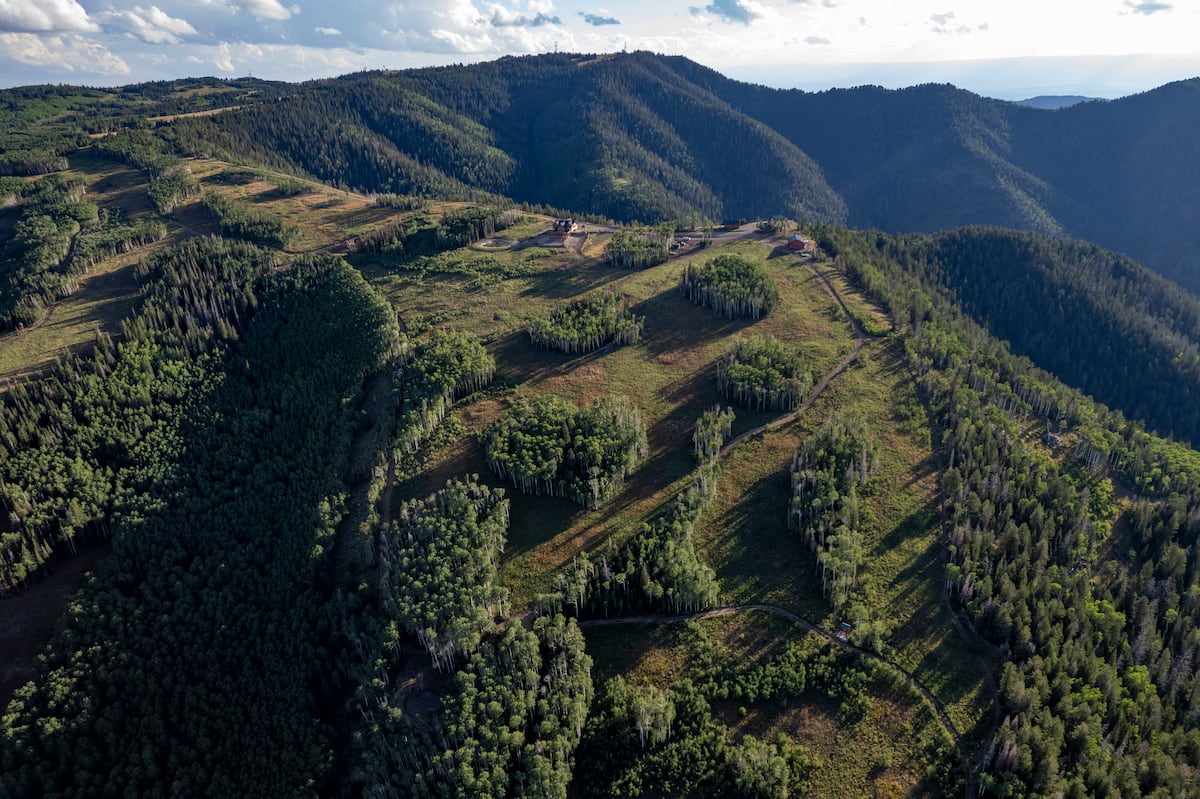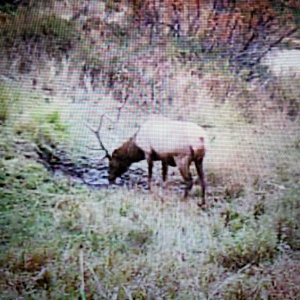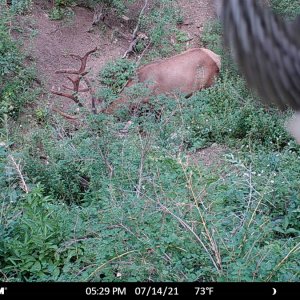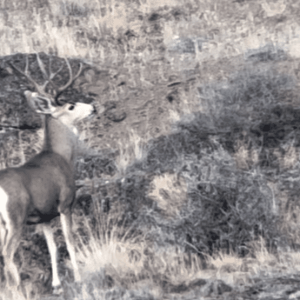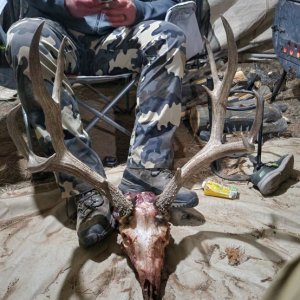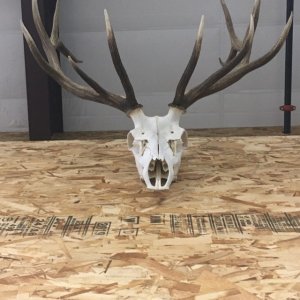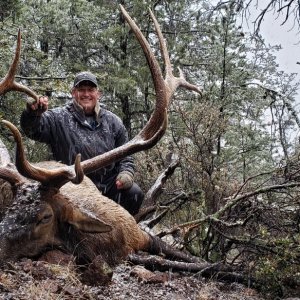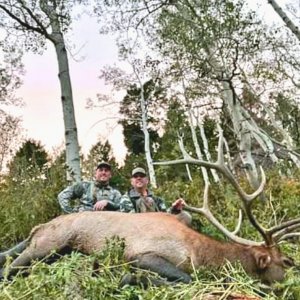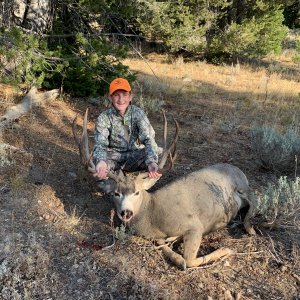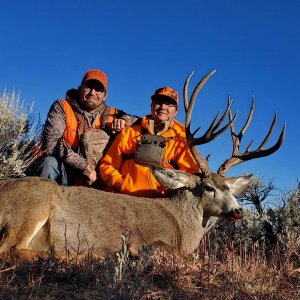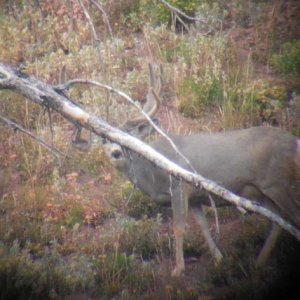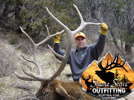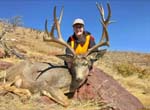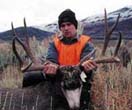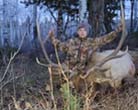Using heavy machinery to tear down trees leaves a lot of debris that the state needs to remove to prevent fires. Clear-cutting large areas of forest leads to erosion and polluted water supplies. And scientists worry about impacts on a variety of wildlife, not just game.
‘A little thing to help’
During the 2016 election season, Siaperas began forging political connections. He donated $2,700 to Donald Trump’s presidential bid and $4,800 to the Republican National Committee. His involvement in politics was encouraged by Don Peay, the head of Trump’s Utah campaign.
Peay, 63, a longtime GOP donor, has been a fixture on Utah’s Capitol Hill for nearly three decades, pushing for hunting-related causes. Lawmakers almost always back the bills he champions and block those he opposes. He was impressed by the roller-felling project and would eventually help form a nonprofit connected to Siaperas’ ranch.
They first met and became friends in 1994, when Peay hosted a rally to bolster the state’s mule deer populations. Shortly after, Peay founded Sportsmen for Fish and Wildlife, a group that raises money for state conservation projects by auctioning off Utah hunting permits at an annual expo.
(Trent Nelson | The Salt Lake Tribune) The annual Western Hunting and Conservation Expo in Salt Lake City. Hunting licenses auctioned off at the event generate state income.
The expo has raised $80 million for the state since 2001. It attracts celebrities like Wayne LaPierre, the former chief executive of the National Rifle Association, and Donald Trump Jr., an avid hunter who was
a keynote speaker in 2016. Two years later, the then-president’s son visited Siaperas’ property, Range Valley Ranch, and
shot a bear and a mountain lion nearby.
In 2019, Siaperas reached a new level of business for his tree-clearing enterprise. He spoke on Capitol Hill after a lobbyist connected him to state lawmakers, Peay said. Several legislators visited the ranch to see the results. That year, one of them requested $2 million on Siaperas’ behalf for “strategic and targeted forest fire treatment.”
The next year, Eric Hutchings, a Republican then serving in the state House of Representatives, said he requested $500,000 to support Siaperas’ business. In an interview, Hutchings recalled that lawmakers were worried about the shrinking Great Salt Lake and the threat of wildfire, given record damage a few years before. “As a Legislature, we were like, ‘What do we do?’” he said, adding, “I feel good about having done a little thing to help.”
Lawmakers earmarked another $900,000 in 2021, totaling $3.4 million in allocations over three years.
That process was unusual. Typically, state environmental experts design projects and find suitable contractors, often through open bidding. In this case, lawmakers handpicked someone with little relevant experience and set aside millions of dollars for his business.
Utah has one of the shortest legislative sessions in the nation: 45 days. That makes the appropriations process a rapid-fire event in which part-time lawmakers —
many of them developers or real estate investors — and lobbyists have mere minutes to make their case to get budget items funded. There is limited input from scientists and experts, and no opportunity for public feedback.
A tailor-made contract
Initially, more than $1 million of those funds went to a roller-felling trial. Siaperas leveled 900 acres of woodland on two private ranches starting in 2020. One of them was Preston Nutter Ranch, a 42,000-acre property that abuts his land and is owned by family members behind Hunt Energy, who are worth nearly $25 billion.
With the pilot project complete, he participated in his first competitive bidding process in late 2022, for the clearing of 825 acres in the state reserve of Currant Creek.
Eight contractors submitted bids, ranging from $552,225 to $3.2 million. Siaperas’ estimate came in at $950,000 — almost exactly what state lawmakers had appropriated in 2021.
(Rick Egan | The Salt Lake Tribune) The Range Valley Ranch last month. When Siaperas bought the ranch, there were too many trees for his liking. “I wanted to see wildlife,” he said.
Days later, the state canceled the process, requiring contractors to take a virtual site visit. The proposal request was reissued in March 2023. This time, the scope of work called for a heavy-duty cable “pulled between two dozers” with a “rotating fulcrum roller to keep the cable elevated roughly 4 ft off the ground.”
Siaperas had patented his fulcrum roller in 2020. His company was the only contractor to submit a bid on the revised proposal.
“It seemed to me that they were custom-tailoring this job just to give it to exactly who they wanted,” said Chris Ivester, whose business was the low bidder in the initial process.
Jamie Barnes, the Utah state forester who oversaw project logistics, said the job could have gone to Siaperas through a sole-source award because he held the patent. State officials decided to have a competitive process anyway.
“I can completely see why people would think that was a rigged bid,” Barnes said. “It was not.” She added that the wide range of previous bids suggested that contractors did not understand the project’s scope.
As it turned out, Siaperas was able to roller-fell only about 10% of the Currant Creek project because the site was too steep for his equipment. The state paid him $240,000, about a quarter of the budget.
The $5 million lodge
His most recent strategy to obtain state funds for his roller-felling company was through his nonprofit, Atlantis USA Foundation, registered in 2022. The charity’s website says it intends to bring about positive change for veterans “through conservation of our lands and our values.” Last year, Peay, who was then serving on its board, appeared before a legislative appropriations subcommittee requesting funds. Lawmakers appropriated $1 million for Atlantis that year and $700,000 this year.
The state budget description for the funds makes no mention of veterans, however. Instead it directs the money to be spent on restoring aspens to decrease wildfires.
In a conflict-of-interest form filed with the Governor’s Office of Economic Opportunity, which is overseeing the $1 million from last year, Siaperas disclosed his intention to hire 106 Reforestation to do the work.
Mike Siaperas completed construction of his Atlantis Lodge, a luxury hunting accommodation, last year.
Since 2020, Siaperas has made campaign contributions to Utah’s governor, Spencer Cox ($10,417); attorney general, Sean Reyes ($25,000); and former House speaker, Brad Wilson ($5,000). Cox and Reyes praised Siaperas in
a 2023 video promoting his nonprofit that compared his efforts to Charles Lindbergh’s solo flight across the Atlantic.
Last September, Siaperas opened the Atlantis Lodge on his ranch. Ben Cervinski, a representative for Siaperas and the nonprofit, said the lodge has cost more than $5 million so far and remains in “phases of completion.” Veterans could stay at special rates, according to the ranch’s website. But for other guests, the lodge was listed at $2,500 a night per person. Smaller cabins, like the one where Donald Trump Jr. had stayed, and glamping tents went for less. Siaperas planned to turn the ranch into a boutique ski resort in winter and had enlisted high school students to dig private biking trails. The website removed the pricing information after Siaperas briefly spoke to a reporter for The Times and The Tribune.
To date, he has not used the money appropriated to Atlantis for any forestry work, officials said. The state of Utah, his primary client, has not identified any sites where roller felling could be deployed, though the governor’s office paid Atlantis $900,000 after the nonprofit submitted an invoice in June 2023.
In an email to the governor’s office last month, Cervinski asked to return that money.
Still, Siaperas and his ventures have collected at least $1.35 million from the state since 2020 alone.
Patience for such projects appears to be wearing thin among some lawmakers. Legislators are investigating the payments to Siaperas’ ventures, a state auditor confirmed. Rep. Casey Snider, a Republican from Cache County, commissioned an audit of the payments to Peay for wolf lobbying this year.
Though Siaperas once claimed in an interview that he could take any business, even one he knew nothing about, and “make it work,” 106 Reforestation is now rethinking its business strategy.
“If you want to lay blame, it’s at the federal government,” said Peay, because it manages most of the suitable land.
He recalled how he and Siaperas envisioned licensing veteran-owned roller-felling companies in every Western state.
“Every veteran would love to have 106 Reforestation on our federal lands,” Peay said, “running big equipment, being out in nature, getting away from all the chaos and making more water, less fires, better wildlife habitat.”
A spokesperson for the U.S. Forest Service confirmed that the federal agency was not considering any roller-felling projects.
106 Reforestation is now trying to “engage” with private landholder clients instead, according to Cervinski. He said Siaperas welcomed the forthcoming audit of his forestry work.
“Audits can draw attention to many things beyond money received and spent,” Cervinski said. “They can help shed light on bureaucratic logjams that can hinder the work that the funds were intended for.”
